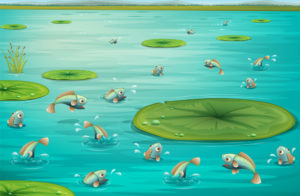 I am currently reading David and Goliath by Malcolm Gladwell. The premise of the book is that disadvantages might actually be advantages, that people who are considered underdogs may in fact have the greatest chance for success, and that obstacles might really be opportunities.
I am currently reading David and Goliath by Malcolm Gladwell. The premise of the book is that disadvantages might actually be advantages, that people who are considered underdogs may in fact have the greatest chance for success, and that obstacles might really be opportunities.
One section of the book focuses on higher education and the idea of being a small fish in a big pond versus a big fish in a small pond. For many high-achieving students (and their parents), the ultimate goal is to go to the most selective college they can get into. However, as Gladwell argues, this may not be the best strategy for success and can, in some cases, set students up for failure.
Gladwell details the path of a student named Caroline Sacks (a pseudonym). From the time Caroline was a little girl, she loved science. She attended a public high school in suburban Washington, DC and was at the top of her class. After visiting several colleges in the summer before twelfth grade, she decided that Brown University was her first choice. The University of Maryland was her “safety” school.
Caroline was accepted to Brown, and off she went for her freshman year, with the intention of majoring in a science field. Yet, things didn’t go according to her plan. In the second semester of her first year, Caroline took a chemistry class. She was doing so poorly in it that the professor suggested she withdraw and take it again the following year.
Caroline followed the professor’s advice and took the course again in the fall of her sophomore year. After struggling mightily, she earned a low B — the first B she’d ever gotten. Not only was the content extremely challenging, the other students were so competitive that they weren’t willing to study together or help each other.
Caroline struggled even more when she took organic chemistry the following semester. She felt like she simply couldn’t grasp the material, yet it seemed like all of her classmates could. She was surrounded by students who, like her, had graduated at the top of their classes and who had always excelled. And because the concepts didn’t come as easily to Caroline as they (seemingly) did to her peers, she felt stupid and lost confidence in herself. She was a little fish in a very big pond, and it totally derailed her.
Ultimately, Caroline decided not to major in science, even though it was her passion. Gladwell asked her what she thought would have happened if she’d gone to the University of Maryland, where she would have been a big fish in a small pond. “She answered without hesitation: ‘I’d still be in science.'”
Gladwell describes another student who got into both Harvard and MIT, decided to attend Harvard, and planned to major in physics. But like Caroline Sacks, this student felt like he couldn’t meet the challenges of Harvard’s science courses and that he wasn’t “good enough” compared to his peers. He ended up going to law school and becoming a lawyer. In Gladwell’s words, “Harvard cost the world a physicist and gave the world another lawyer.”
In addition to relaying the stories of these two students, Gladwell presents a large amount of data that demonstrates how being a big fish in a little pond can be just as, if not more, advantageous than being a little fish in a big pond. Gladwell explains the “Big Fish-Little Pond Effect” as follows: “The more elite an educational institution is, the worse students feel about their own academic abilities . . . And that feeling — as subjective and ridiculous and irrational as it may be — matters. How you feel about your abilities — your academic ‘self-concept’ — in the context of your classroom shapes your willingness to tackle challenges and finish difficult tasks. It’s a crucial element in your motivation and confidence.”
I myself observed and, to some extent, experienced, the Big Fish-Little Pond Effect. I attended Washington University in St. Louis, a highly selective college that I likely would not get into today. I had two friends who started out pre-med, but after taking a few of the pre-med courses and seeing how difficult they were, they both decided not to pursue medical school. Would my friends have stuck with pre-med if they had gone to less selective colleges? Obviously, there is no way of knowing, but Wash U’s pre-med track was known for “weeding out” students. I’ve heard this is true at many highly selective colleges.
Although I wasn’t pre-med, I definitely felt like a little fish in a big pond in my freshman year. From kindergarten through high school, I had always been one of the top students. But in college, I quickly realized all of my peers had been top students. On the one hand, it was wonderful to finally be surrounded by students who were as excited about learning and as conscientious as I was. On the other hand, it was intimidating.
In my first semester, I would sit and listen to what my peers said in class discussions, and I would find myself hesitating to raise my hand, even though I had always been eager to participate in high school. Eventually, I overcame my feelings of inadequacy and rose to the challenges of Wash U. But it was an adjustment, for sure.
Much of whether you will be more successful as a big fish in a little pond versus a little fish in a big pond has to do with your personality. But as high-achieving students and their parents set their sights on the most selective colleges, I would urge them to consider whether those really are the best places for them or if, in fact, they’d be better off in a “smaller pond.”





